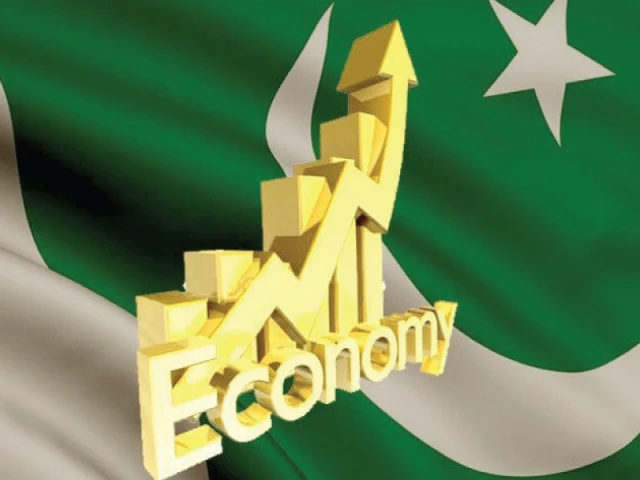'Integrate Uraan into CPEC phase 2'
Experts highlight significance of structural reforms, Chinese collaboration

To promote prosperity and eliminate abject poverty, economic nationalists urged the government to form think tank corridors and incorporate all 5Es of Uraan Pakistan in the second phase of China-Pakistan Economic Corridor (CPEC).
The five-year national economic transformation plan titled Uraan Pakistan, was recently launched by Prime Minister Shehbaz Sharif. It focuses on the 5Es; Exports, E-Pakistan, Environment & Climate Change, Energy & Infrastructure, and Equity & Employment.
Experts said that the government has introduced Uraan, for the quick macroeconomic revival through different but integrated efforts. However, they fear that without introducing meaningful structural reforms in the economy, industry, productive channels, tax, energy, law and order situation, and political stability, it may not deliver the desired goals of achieving the targets set for exports, GDP, investments, and qualitative industrialisation. They stressed the need for a complete overhaul of the bureaucratic set-up, transforming it into a people-, business-, and investment-friendly entity. The nurturing of qualitative human capital through investments in higher educationmainly in digitalisation, artificial intelligence, sciences, and space alongside hybrid agriculture, the establishment of special economic/export zones with incentives, joint ventures in electric vehicles, solar and wind panels, lithium batteries, and accelerating qualitative industrialisation and diversifying exports are essential.
Regional expert and Executive Director of the Centre for South Asia & International Studies (CSAIS) Islamabad, Dr Mehmoodul Hassan Khan said China has become Pakistan's largest investor, business ally, and trading partner since CPEC's inception. Although it is designed as a domestic programme through local resources, the success of Uraan depends heavily on China's constant and continued support, cooperation, and coordination in different key areas, mainly exports, E-Pakistan (digitalisation), climate change, infrastructure, and equity & empowerment.
"China has rich expertise and global supply chains in these areas, enabling the government of Pakistan to achieve these targets under the flagship of Uraan, said Khan adding that, "Close liaison with the Chinese government and companies, and merging these areas with CPEC Phase 2.0 would be the right policy in the right direction." Dr Khan said achieving the targets of the 5Es would not be an easy task, but with a valid Chinese connection, the government would be better placed. "It is high time that all 5Es must be included in the CPEC Phase 2.0, making it a mutually beneficial proposition."
"Let us begin with the execution of the 5Es, which may be further developed, diversified, and determined through supporting and promoting the Chinese joint ventures in textiles, manufacturing, infrastructure development, digitalisation, modernisation, green technologies, hybrid services & agriculture sectors, along with close cooperation in metal & mining," he said. He said simply digitalisation, green technologies, the relocation of qualitative industries to Pakistan, the formation of an artificial intelligence corridor, and further banking and financial integration would be effective tools for achieving the targets of Uraan.
Dr Khan said, "There is an urgent need to form many corridors of think tanks, mainly in applied economics, public policy, good governance, climate change, International Relations (IR), marketing, investment, and financial disciplines to support Uraan. Thus, discarding blue-eyed think tanks would be essential. The Special Investment Facilitation Council (SIFC) could lead and reach out to experienced economic think tanks for Uraan's success.
"Building the domestic economy without the help of the International Monetary Fund (IMF) and World Bank, and operationalising and channelising Islamic banking and the economy, would be a value addition. The development of SMEs, youth entrepreneurship, promotion of start-ups, immense social development, and, last but not least, rigorous economic diplomacy would be vital for the quick revival of the economy," he said.
The policymakers should chalk out comprehensive economic, industrial, investment, fiscal, monetary, banking, and people-friendly policies gearing Uraan in the right direction through openness, transparency, accountability, good governance, rule of law, and the like. Moreover, complete digitalisation of the national economy, elimination of the black economy, smuggling, the end of the phobia of unlimited discretions, the end of illegal land grabbing, the overhauling of the rotten justice system, and, last but not least, the true democratisation of wealth and resources disseminating the spirit of a fair, free, and merit-based society are essential. Speaking about making the Uraan programme successful, eminent economist Dr Shahid Hassan Siddiqui said enhancing the GDP ratio, growing domestic savings, ballooning quality investment, and making the taxation policy judicious and equitable can play a vital role in boosting the national economy.



















COMMENTS
Comments are moderated and generally will be posted if they are on-topic and not abusive.
For more information, please see our Comments FAQ